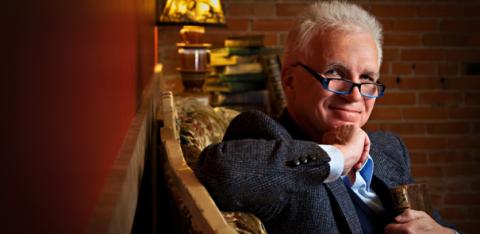Faculty Stories & Profiles
Murder Through the Ages
Image


Dr. Malcolm Greenshields
It seems unlikely that studying the history of the Catholic Church in France would lead someone down the path to murder, but that is precisely what happened to Dr. Malcolm Greenshields.
Although he began his career as a historian studying aspects of religion and crime in France before the Revolution of 1789, Malcolm’s most recent research and writing explores the history of homicide in Western Europe and North America.
Throughout his twenty five-year career at the University of Lethbridge, Malcolm has been able to greatly increase the scope of his research. This freedom to explore is among the many reasons that Malcolm considers the U of L such a great place for faculty and students. Malcolm came to the university in 1985, and while he was lured away by a larger institution in 1987, he soon found that he missed many things about the University of Lethbridge and the city itself. When the opportunity presented itself to return to his old job, he and his family returned to Lethbridge after only one year away.
The warm Chinook winds and the spectacular beauty of the Rocky Mountains were both factors in Malcolm’s decision to return to Southern Alberta, but the pace of life was also a major factor. “The city of Lethbridge is a convenient place to live, with a strong arts community, and a general sense of the need for community service and participation,” he explains. “There are a wealth of public and private art galleries, excellent live music venues like The Slice and The Owl Acoustic Lounge, and a surprising number of opportunities for excellent live classical music and theatre, both through the university and other local productions such as those put on by New West Theatre.”
For an Historian, Lethbridge and the surrounding area also hold considerable allure. The culture of ranching, agriculture, and irrigation, First Nations traditions, and religious diversity, combined with an exciting past and a vibrant present, are the factors that make Lethbridge “endlessly interesting” from Malcolm’s perspective.
Malcolm has known life at the U of L to be “a free learning and teaching environment,” which is as much of a benefit to the students as it is to the faculty. Professors who are required to broaden their fields of inquiry are often better able to speak to the students more general questions. They are also more able to place their areas of specialization in context when dealing with upper-year undergraduate and graduate students.
What holds true for all students is that they will have more opportunity to interact with their professors here than they would be likely to have at a larger institution. “I’ve really enjoyed getting to know my students. I’ve had some outstanding History students over the years, many of whom have gone on to do remarkable things in a vast range of areas,” he notes. “In fact, I can’t think of a field that they haven’t been in. Many have also become my friends, and, a few, my colleagues here at the university.”
As a place to work, Malcolm has found that the U of L offers many advantages to faculty, both in terms of teaching and research opportunities. The small size of many of the Departments ensures that they will be peopled by faculty who are able to teach a broad range of courses, while still remaining vital scholars within their area of specialization.
“The necessity for breadth of knowledge, which is often greater than it would be in larger schools, comes with being a member of a relatively small Department,” explains Malcolm. For the scholars themselves, this “greater possibility for breadth as well as depth,” also applies to the research topics they choose to pursue. Malcolm’s own research interests are a case in point.
While two of Malcolm’s books have been concerned with aspects of crime, the bulk of his scholarly output has focused on aspects of the history of religion. His most recent book, a study of religious reform, is a work that he and co-author Michael Hayden had been collaborating on for twenty years. With the book behind him, Malcolm has been free to concentrate on another topic that has also intrigued him for a number of years: “the history of homicide in what became the richest countries of the western world.”
For Malcolm, the link between religion and homicide is not as weak as you might expect: “While blasphemy was once a crime in the western world, it is now merely a sin. The same is true of fornication. The relationship between crime and religion has been historically dynamic, but culpable homicide has endured as both a crime and a sin.”
“It’s quite common to think that things were better in the past, that crimes were fewer, so crime is always rising in many people’s minds. And, quite often, that is the opposite of the truth,” Malcolm notes.
A falling murder rate has been the long-term trend in western countries over the past five hundred years or so, although the public perception does not always reflect this fact.
“There is often a popular ‘gut’ feeling that violence is growing and life in societies like ours is more dangerous than ever. Rather than acting on the basis of emotion, policy makers can use the statistical record to get an informed perspective on what has actually happened, and how and where the problem has been effectively treated.”
“Homicide is demanded by certain subcultures,” explains Malcolm. “The more accurately we can locate those subcultures within our society, the easier it will be to reduce the number of homicides improving the safety of our communities overall.”
As seen in Lethbridge Living, May 2011.
Written by John Greenshields
